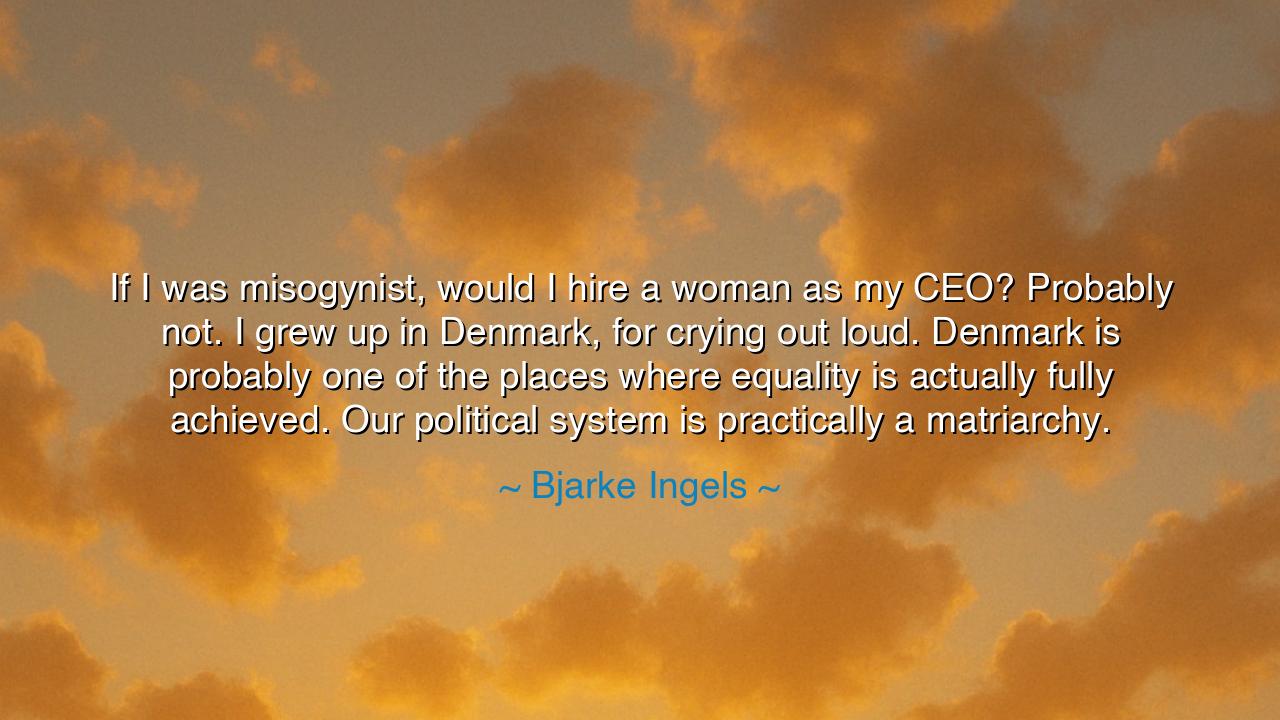
If I was misogynist, would I hire a woman as my CEO? Probably
If I was misogynist, would I hire a woman as my CEO? Probably not. I grew up in Denmark, for crying out loud. Denmark is probably one of the places where equality is actually fully achieved. Our political system is practically a matriarchy.






The words of Bjarke Ingels, architect of both cities and ideas, echo with the confidence of one who has seen balance in creation: “If I was misogynist, would I hire a woman as my CEO? Probably not. I grew up in Denmark, for crying out loud. Denmark is probably one of the places where equality is actually fully achieved. Our political system is practically a matriarchy.”
Yet beneath this proud declaration lies not arrogance, but the quiet flame of a truth well-lived — that where equality flourishes, civilization itself takes root and blooms. Ingels speaks not as one who merely believes in equality, but as one shaped by it, molded in a land where women and men stand shoulder to shoulder, and where power is not a contest of dominance but a shared endeavor toward beauty and order.
Long before his words were spoken, the ancients knew that the strength of a people depends not upon the might of its warriors nor the cunning of its kings, but upon the harmony between the masculine and the feminine. The goddess and the god, the mother and the father, the builder and the nurturer — each holds half of creation’s key. When one hand holds both, the world is built unevenly, but when both hands work in concert, the structure stands firm against the storms of time. So too, Ingels’ Denmark — a nation often praised for its egalitarian spirit — stands as a beacon of what may be achieved when gender ceases to be a barrier, and becomes instead a bridge toward greater understanding.
In the north, the old sagas spoke of shieldmaidens — women who fought beside men, not behind them. Their valor was not exceptional but accepted, for the Norse understood that valor has no gender, nor does wisdom, nor vision. That ancient spirit endures in modern Denmark, where the idea of equality is not shouted as a slogan, but woven into the rhythm of daily life — into the governance, the education, and even the arts. Ingels, child of this heritage, speaks as one who has seen equality not as an aspiration, but as a foundation already laid.
Yet even in such lands of light, shadows remain. The boast of “full equality” tempts the heart toward complacency. True equality is not a mountain one climbs once, but a path that must be tended with vigilance and humility. To believe that the journey is complete is to let the weeds of prejudice grow unseen. History teaches us that progress, though achieved, can be undone by silence. The story of women who entered the halls of power only to face unseen walls — softer than stone, but harder than steel — reminds us that equality proclaimed is not always equality practiced.
Let us remember the tale of Queen Margrethe I of Denmark, who, though living centuries before Ingels, united the Nordic kingdoms under her rule. Her wisdom preserved peace in a world built by men for men. Yet when her reign ended, her name was almost forgotten, her deeds absorbed into chronicles written by those who did not wish to remember a woman as sovereign. Her story reminds us that even in lands that rise high, memory must remain vigilant, lest the winds of forgetfulness erase the footsteps of those who first carved the path toward justice.
Therefore, let Ingels’ words not be heard as pride alone, but as a call to stewardship — a reminder that equality, like architecture, is never finished. The structure must be reinforced, its foundations checked, its walls renewed. The work of one generation becomes the inheritance of the next, and each must choose whether to preserve or neglect the sacred design. The matriarchy he speaks of is not the rule of women over men, but the reign of balance over division, where nurturing and leadership are no longer opposites but allies.
So, to those who listen in the quiet of the night or the bustle of the day: let this truth take root in your heart. Build your homes, your friendships, your nations as architectures of equality. Hire with fairness, speak with respect, lead with empathy. Do not rest on the laurels of progress, but continue to lay stone upon stone toward a society where no one need defend their worth by proof or pride. For when the day comes that equality needs no defense, only then will humanity stand complete — and the world will echo not with argument, but with harmony.






AAdministratorAdministrator
Welcome, honored guests. Please leave a comment, we will respond soon